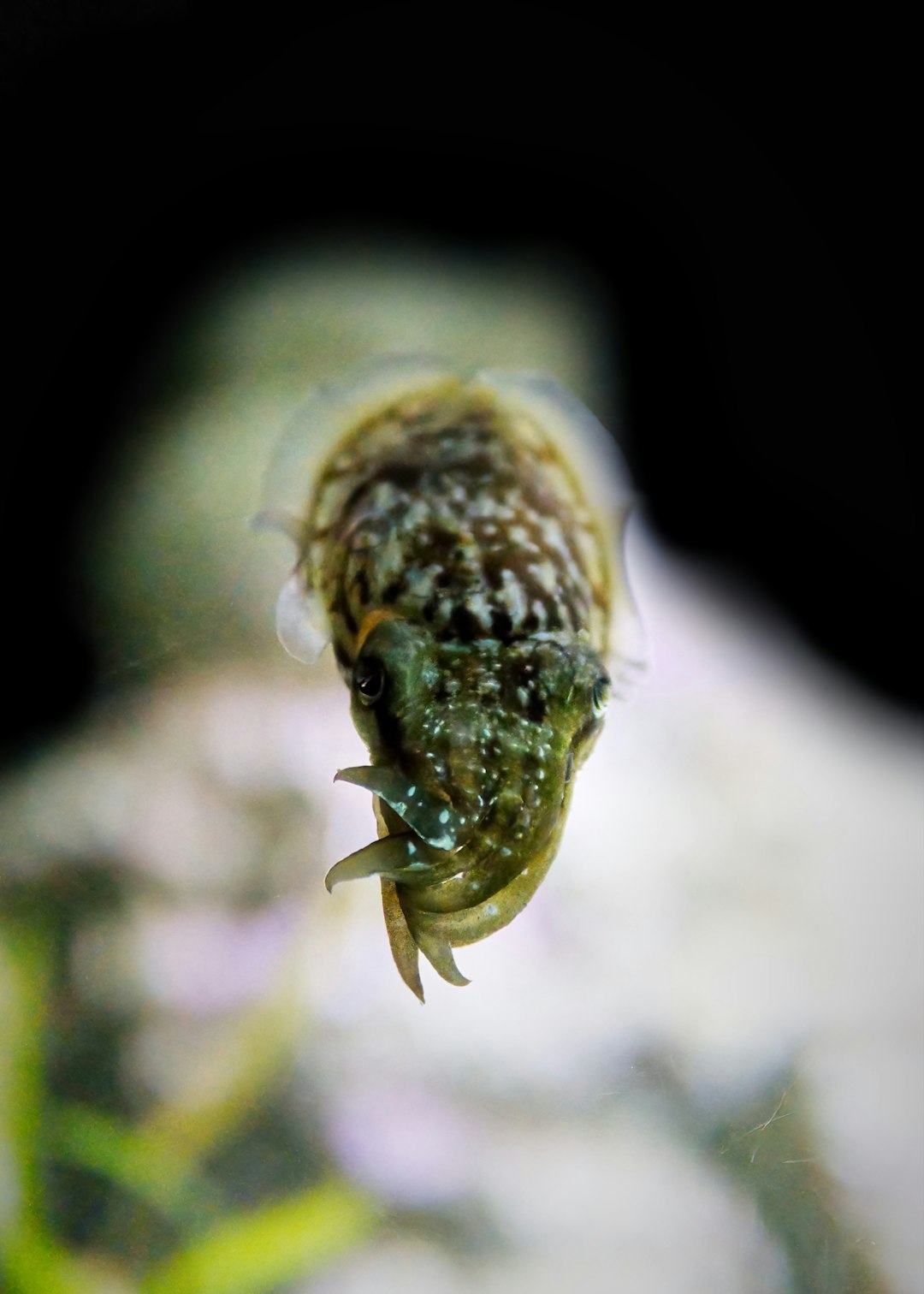Squid
Squid may be one of the most diverse groups of invertebrates on the planet. Their range extends across the ocean, from shallow depths to abyssal depths, and they come in a variety of different shapes and sizes. Some species of squid can grow to a gargantuan size of nearly 60 feet, while others remain small, rarely growing larger than a few inches.
The anatomy of the squid is quite complex. It has two specialized tentacles for catching prey and four pairs of arms used for moving about. Its body is covered in chromatophores that allow it to quickly change its color and blend in with its surroundings. The eyes of the squid are large and complex, allowing it to see near and far, as well as detect color and motion. What’s more, some species of squid possess bioluminescent organs that can emit light, creating a beautiful glow in the darkness of the deep sea.
Squid are also renowned for their fast swimming ability. They use jet propulsion to thrust themselves through the water at impressive speeds. Some species of squid can reach speeds of up to 50 km/h, allowing them to catch their prey with ease.
Squid are also unique in their feeding habits. They use a special process called “ram feeding”, where they open their mouth wide and suck in huge volumes of water, along with any prey inside. This technique allows them to quickly capture their dinner before it has a chance to escape.
Despite their delicious flavor, squid have an undeserved reputation as pests. Many people assume that squid will devour their prized catches and destroy their fishing lines, but this is not the case. In fact, squid are actually an important part of the marine ecosystem. They feed on smaller organisms, such as tiny fish or shrimp, and provide an important food source for larger predators.
All in all, squid are fascinating creatures with a unique and alluring anatomy. From their size and color to their swift movements and complex eyesight, squid are truly an incredible species. We have much to learn about them, and hopefully, future research will help us better understand these remarkable creatures.
Squid dishes
A selection of Squid dishes.
Arròs negre
Ah, the boldly flavored dish of Arròs negre! It is an old Catalan favorite that speaks to traditional Catalan heritage and contemporary flair. Aromatic and complex, this delightful rice dish packs a punch – while also providing a hearty and well-balanced meal.
Arròs negreDried shredded squid
If you're a fan of seafood and have a hankering for something unique and different, then dried shredded squid is a perfect dish for you. The crunchy strips have a delightful texture, and the taste evokes a sharp salty sea breeze. The intense flavor of the squid is tempered by a variety of herbs and spices, making it an alluring dish to sample.
Dried shredded squidSquid cocktail
As I took my first bite of the famous Squid Cocktail, I had a long-overdue epiphany. The succulent, tender squid complemented by the zesty tomato base and crisp, tangy lemon juice was a delightful palate pleasing experience that has left a lasting impression on me.
Squid cocktailCuttlefish
Ah, Cuttlefish. An under-appreciated item on any connoisseur's dinner plate, the slow cooked delicacy is certainly one of the most unique entrees you’ll find in a seafood restaurant. It has an interesting texture and flavor reminiscent of calamari, yet wholly its own. Let’s look a little further into the craft behind this oft-overlooked culinary treat.
CuttlefishSquid
The mysterious and fascinating creature that is the squid carries a wide array of delectable delights in its many forms. Whether it's served fried or boiled, grilled or raw, squid is an often overlooked, yet incredibly versatile ingredient that makes for a tasty meal. When its sweet flavour is complemented by the right spices, like chili and garlic, it can add a delightful dimension to any dish.
One of the most common squid dishes is calamari. Calamari is usually deep-fried, and served with a side of tartar sauce as an appetizer. The tentacles give the dish a crunchy texture, while the rings make for a softer bite. If you prefer a healthier version, you can opt for baking or grilling - simply coat the squid pieces in olive oil and spices, then cook until they are lightly browned.
Squid can also be cooked thoroughly and chopped up into small pieces to create a stir fry or ceviche. The mild taste of the squid pairs nicely with more pungent ingredients like soy sauce, lime juice, and garlic, making for a delicious and nutritious meal. Strands of stir-fried squid can also be used to top a salad or noodles, adding a unique depth to the dish.
If you're looking to add a bit of excitement to your meal, try incorporating squid into a casserole. This delectable seafood dish can be cooked with a variety of ingredients like potatoes, tomatoes, olives, and peppers. It's a great way to get all the delicious flavours of the sea without having to actually go fishing.
Last but not least, one of the tastiest ways to enjoy squid is to pair it with citrus and herbs. A simple marinade of lemon juice, olive oil, and rosemary leaves can really bring out the natural sweetness of the squid. Serve it alongside rice or even mashed potatoes for a truly scrumptious meal.
No matter which way you end up preparing it, squid adds a delightful flavor to any dish. So the next time you’re loathe to break out the same old recipes, why not give this underrated seafood a chance and discover a whole new world of taste?
History of Squid
If you are a fan of seafood, you have likely encountered the delicious dish known as Squid. Originating from the ocean depths, this savoury meal is not only a culinary delight but also has a long and interesting history.
The origins of squid date back thousands of years, with the first mentions of it in the Italian Renaissance. At the time, squid was not particularly popular and was mainly used as a cheap and easy way to increase caloric intake. However, as the centuries passed, its popularity began to slowly increase, leading to its eventual widespread use in many different cultures.
Eventually, its deliciousness became impossible to ignore and it began to spread across the globe. With its rich and unique flavor, it was quickly embraced by many chefs, particularly those seeking a unique take on seafood dishes. It began to be found on the menus of the most esteemed restaurants in the world, becoming an iconic food item.
Today, squid remains a mainstay of seafood cuisine, delighting diners with its savory taste. You can find it prepared in numerous ways, from tempura to stir fry, there is no end to the variety of this delightful dish. Moreover, squid is also incredibly nutritious, providing high doses of protein, B vitamins, and various minerals such as zinc and selenium.
When people think of squid, they often think of it as just another type of seafood. However, its importance to our culinary history should not be understated. It is a delicious and complex food that can be enjoyed by people of all ages, providing a tantalizing hint of the ocean in every bite.







